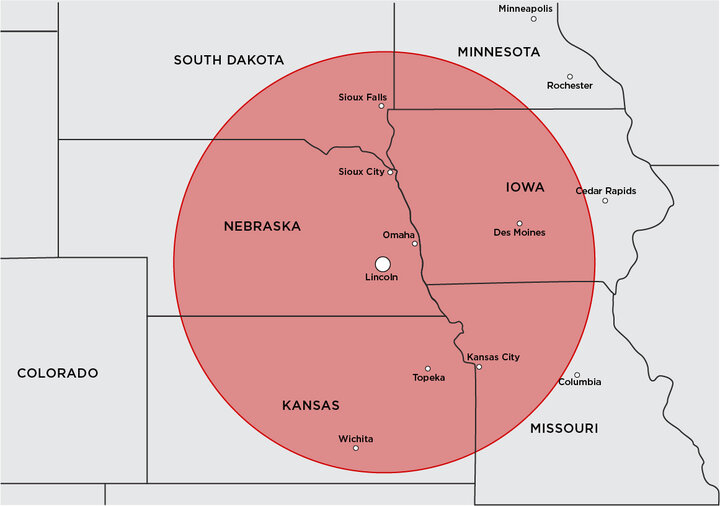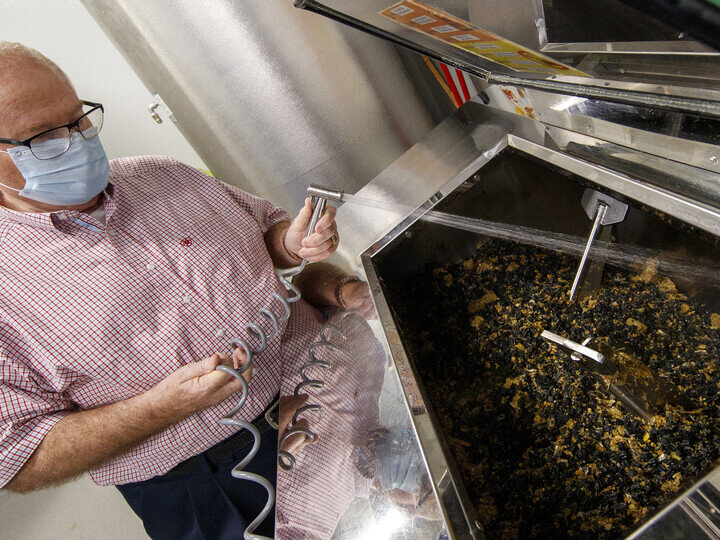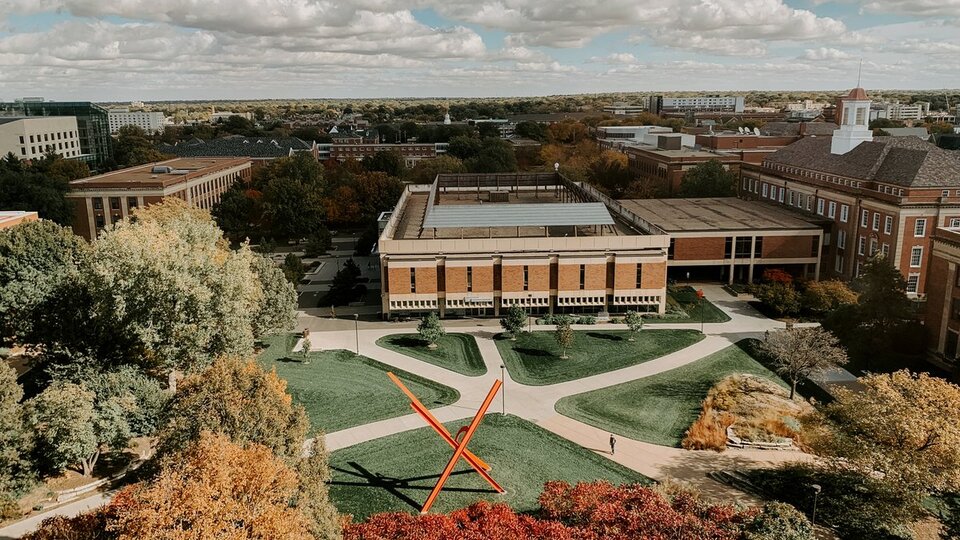Dining Services is engaged in many initiatives in the hopes of creating a more environmentally friendly and sustainable campus. We are pleased to work with various student groups and campus partners in creating a campus culture of social, economic, and environmental responsibility.
Many of our sustainability efforts closely align with the United States Environmental Protection Agency's Food Recovery Hierarchy. The Food Recovery Hierarchy gives us a basic framework from which to strategize and implement sustainability initiatives and goals.
Food Sourcing Food Insecurity Source Reduction Food Waste Food Production
Food Sourcing
The University of Nebraska-Lincoln defines local as foods obtained from a 250-mile radius of Lincoln and anywhere in Nebraska.
The Nebraska. Local. (formerly known as Good. Fresh. Local.) program began in September 2005 and is a very popular local dining program with students and the university community.
Current producers in the Nebraska. Local. program include:
| Arbor Day Coffee | Del Gould Meats | Eat Fit Go | Godfather’s Pizza | Grain Place Foods | Heartland Gourmet |
| HR Poppin’ Snacks | Hiland Dairy | Loeffel Meat Market | Midamar | Pekarek’s Produce | Raikes Beef Co. |
| Rotella | R U Nuts | Samha Foods | Smoking Gun | The Gourmet Granola | Tielke’s Sandwiches |
| Twin Springs Pecans | UNL Bee Lab | Valhalla Bee Farm | Wicked Good Foods |
Micro-Farm
The Babylon micro farm located within the Selleck Food Court provides students with various healthful, locally sourced produce options used at Moxie’s Gluten-free Cafe.

Preference will be given to food that comes from Nebraska farmers, producers and manufacturers.
Food Insecurity
A lack of availability to food by individuals due to financial reasons or other burdens in an individual’s life.
“Nearly 1 in 3 students on UNL’s campus worry about not having enough food until they have money to buy more.” - Husker Pantry
Husker Pantry
We work with ASUN student government and the Husker Pantry to hold food drives to supply food to the Husker Pantry.
Dining Services donates one free meal ticket to Husker Pantry for every meal plan sold by University Housing, giving students needing assistance an opportunity to eat meals at the dining centers.
Husker PantryFoodNet
This 501c3 non-profit organization is used by Dining Services to provide excess food for individuals throughout the Lincoln community.
Dining Centers maintain excess food at correct time and temperature requirements, then FoodNet picks up the food and distributes it to identified distribution locations throughout Lincoln.
FoodNetIn May 2023 students donated $17,000 worth of food through semesterly residents’ hall food drive.
- At the end of each semester, the Husker Pantry teams up with the Lincoln Food Bank allowing students to use their leftover dining dollars and meal swipes to donate food purchased in the Herbie’s Market to help the community.
Source Reduction
Defined as the preventing food from going to waste by growing, buying, and preparing only what is needed. Dining Services pursues increased source reduction in a number of ways.
OZZI reusable containers and receptacles
Embrace sustainability on campus. Grab your meals in reusable containers and return them when empty. We'll wash and reuse them, slashing paper waste and costs, and shrinking our carbon footprint. It's an easy, convenient way for students to help make the university more sustainable while reducing the number of to-go paper products needed. Join the movement for a greener future.
This project only works if students return their OZZI containers. Help us keep our plastic purchasing to a minimum and return your OZZI.
OZZI Containers & ReceptaclesNo Styrofoam
University of Nebraska (NU) Central Administration and UNL are foam-free campuses. NU prohibits the sale, procurement or distribution of packaging foam or expanded polystyrene (EPS) in food containers and discourages packaging materials.
The responsibility for complying with the policy rests with the individual departments, faculty, staff, students, and suppliers. If a Registered Student Organization is observed in violation of the policy, they will not be reimbursed for their purchases. Contracted suppliers will not sell, give or deliver Styrofoam food service product to the campus. If a supplier is observed in violation of the policy, they will be required to remedy the situation.
Foam Free CampusHerbie's Markets
No Plastic Bags
Herbie's Market does not use plastic bags in their facilities. Paper bags are available for use when requested.
Tazza Reusable Mug Program
Background Information
- Billions of single-use coffee cups are used every year. Each is used for an average of 13 minutes before disposal - most times in the trash
- Most to-go coffee cups cannot be recycled, and many compostable cups end up in the landfill.
Program Details
- Each tumbler/mug will come with a vinyl QR code sticker.
- To redeem the discount, the QR code sticker and tumbler/mug must be presented together at the time of purchase. There are no exceptions.
- The standard discount is $1.00 off any drink when the QR code and tumbler/mug are presented together at the time of purchase.
- The discount is only valid on drink purchases, not food.
- The discount is only valid for one drink per customer per visit.
- The Tazza employee will scan this QR code sticker to enable the discount on each drink on each return visit.
- Customers can place the QR code sticker on the tumbler/mug; however, we recommend placing it on the bottom of the cup or holding it separately.
- Treat this sticker like cash; we can’t replace it if lost or damaged, no acceptations.
- Purchase of a tumbler/mug for the discount program will be valid until May 16th, 2025.
- We recommend hand-washing cups when possible and ask that you bring them back to refill clean!
Food Waste
“The decrease in the quantity or quality of food resulting from decisions and actions by food suppliers in the chain, excluding retailers, food service providers and consumers.” – Institute of Science and Technology
An example of food loss is food that is thrown away at the time of harvest.
Pre-Consumer/Post-Consumer Food Waste
Inventory Control
Only ordering what is needed, finding ways to use leftover inventory, and not letting foods expire.
Portion Awareness
Students can help reduce food waste on campus by taking smaller portions and going back for seconds when they want more.
Composting
“Compost is created by combining organic wastes, such as wasted food, yard trimmings, manure, or wood chips, and stabilizing the mixture through a curing process that destroys pathogens by using high temperatures.” – United States Environmental Protection Agency
Composting food decreases the amount of food waste that ends up in landfills and, therefore, reduces the carbon footprint. The University of Nebraska–Lincoln utilizes compost bins on East Campus to help reduce the amount of food waste produced by the facility.
Our East Campus Dining location donates fruit and vegetable trimmings to our East Campus Landscaping Operations in order to support the composting effort at UNL.
Biodigesters
Enclosed units which work by degrading food waste into smaller particles, similar to how a stomach digests food. The material that is left after the biodigester breaks down the food can be added to soil to provide fertilizer or nutrients or can be disposed of in the sewer system.
We use biodigesters at dining center locations (Abel, Cather, Harper, East and Selleck) to help reduce transportation costs and the amount of food waste placed in landfills.
Biodigesters help reduce food waste at UNL
Watch on YouTube
Industrial Uses for Used Cooking Oil
Dining Service dining centers work with other companies to recycle oils used for food preparation into fuel or other uses.
Dar Pro Solutions
Dar Pro Solutions takes our used cooking oil and the majority of used cooking oil is recycled and used in the production of clean-burning biofuels.
Food Production
LeanPath
A tool that allows food establishments to track what food is being wasted and why. It is a software, analytics, and collection technology that measures the amount of food wast produced in each dining center. The program also allows food establishments to understand why a certain food is being wasted and reduce the amount of food waste it produces.
As of April 22, 2024, LeanPath helped Dining Services:
- prevent 180,223 pounds of food waste
- avoid 570 metric tons of CO2 emissions
- keep 150,180 meals in the food system.
Each dining center has a baseline number for the amount of food waste produced that they aim to not go over. Any amount that is less than the baseline number is considered food waste that was prevented.
Following Recipes
Standardized recipes produce consistent quality and helps Dining Services prepare exactly the right amount of food to meet the campus' needs.
